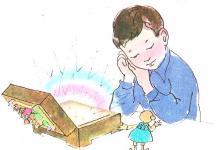For each answer "yes" -1 point, for "no" -0.
1. Do you often fall asleep while watching TV?
2. Does it happen that in the morning you do not hear the alarm clock?
3. Do you reset your alarm clock so that you can sleep through breakfast?
4. Are you usually more irritable in the morning?
5. Do you often feel hopeless?
6. Does the coming day seem gray and uninteresting to you in the morning?
7. Do you often fall asleep (doze off) while traveling by metro (trolley bus, bus, tram, train)?
8. Do you drink more than 3 cups of strong coffee or tea per day?
9. Do you feel sleepy after getting up in the morning and having breakfast?
10. Do you “have no energy” to do exercises in the morning?
11. Do you usually feel sleepy when you drive?
12. Does everyday work seem difficult and uninteresting to you?
13. Does it happen that you fall asleep on duty, unwittingly?
14. Do you feel like taking a nap during a meeting, meeting, or five minutes?
15. Do even small amounts of alcohol make you sleepy?
16. Do you feel like taking a nap after a hearty meal, even if you haven't taken alcohol?
17. Do you often fall asleep while reading newspapers, magazines, books?
18. Do you sleep more than usual on weekends?
Calculate the amount of points you have scored and evaluate the result.
- If you got 4 or less points, then you can only be congratulated - everything is in order with your sleep, you have enough of it.
- If you have 5 or 6 points, then you sometimes do not get enough sleep, but this does not yet affect your health and ability to work. This is not dangerous if sleep disturbances do not deepen.
- If you dialed from 7 to 9 points, then, obviously, you do not get enough sleep and therefore are absent-minded and irritable. Try to adjust your daily routine.
- If you have from 10 to 12 points then you are very tired. You need to rest and sleep off, because due to lack of sleep, you, most likely, have already begun to forget about the appointments, about the planned cases, you are apathetic and close to depression. Start your day with morning exercises. Take frequent breaks while you work. Occasionally drink soothing herbal teas at night (especially mint tea, a decoction of adonis). It is not bad to sleep on a pillow stuffed with well-dried forest hay or dry hops. Before going to bed, you can take 1 teaspoon of honey in 0.5 cups of weak tea or just boiled water. Washing your head before going to bed with an infusion of oregano herb helps to improve and prolong sleep (a handful of herbs is brewed with 3 liters of boiling water, then insisted, wrapping the dishes for 1-1.5 hours). Well, if you can’t fall asleep, then you can moisten large pieces of cotton wool with cologne, perfume or lotion and put them in your ears (this, at the same time, will save you from the “noise interference” that interferes with falling asleep).
- Well, if you have over 12 points, then you risk your life every minute (and maybe the lives of others). Constant drowsiness can cause you to get hit by a car or fall into an open plumbing hatch. Drop everything and take a vacation! To restore your health and lost strength, you need to sleep at least 7-8 hours a day for at least a week! If you yourself can not cope with the lack of sleep, consult a specialist (best of all, if you have such a specialist, a somnologist).
Can't lie down after morning prayer? Struggling with sleep, looking forward to the end of the day? Starting to fall asleep at work? Are midday meetings your favorite time to take a nap? The hustle and bustle of our dynamic life leaves almost no time for rest.
If before it was thought that only students could never get enough sleep, now more and more people suffer from lack of sleep. And Muslims living among people who are not concerned about prayer times face additional challenges.
Despite the fact that sleep is the most important component of the day, we do not pay enough attention to it, taking it for granted. How many of us seriously wondered: “How much sleep do I need? What should I do about insomnia? Can I "catch up" on sleep? » Believe it or not, the US has the National Sleep Foundation, which is established to "improve the quality of life of millions of Americans who suffer from sleep disorders and prevent accidents associated with lack of sleep or sleep disorders." Allah, Great and Glorious, speaks of sleep in Sura An-Naba: “And made your sleep a rest…” (78:9). Prophet Muhammad (SAS) argued that our body has a right to us. The carefully preserved stories from the life of the Prophet (SAS) tell us that he worked most of the day for the good of his community, and devoted most of the night to prayer. It is reported that at night the Prophet (SAS) slept very little, and during the day he allowed himself a short sleep between the prayers of zuhr (noon) and asr (afternoon). Perhaps someone will be surprised how the Prophet (SAS) managed to sleep so little, but the prophetic mission assigned to him by Allah forced him to work on himself. In modern society, people do not track the phases of their sleep. Indeed, many of us do not even know what happens during sleep (see diagram).
However, we all know that if we do not get enough sleep, we will be irritable and lethargic. Take, for example, the usual summer day, when the day is very long and the night is short. In St. Petersburg, the city of "white nights", the morning prayer can begin as early as 03:30, and the night prayer only at 0:50. The following phases of sleep are distinguished: Phase 1: Muscles weaken, brain waves are fast and irregular Phase 2: Waves get bigger, bursts of electrical activity Phase 3: Big, slow waves (delta) Phase 4: Still big, slow waves Phase 5: 1 hour or more, REM - rapid eye movement (brain waves are active, as if you are already starting to wake up, dreaming) Phase 6: REM cycles are repeated until you wake up (75% - sleep without blinking, 25% - sleep with blinking (dreams) By the time the day ends and we go to bed, most often after midnight, the next day is already in. Under such circumstances, waking up for morning prayer is very difficult, to say the least.
What then to do after the prayer? Consider this scenario: you finish your morning prayer at 05:00, but you are going to work, which starts at 09:00, only from 07:30. What will you do during these 2-2.5 hours? Most likely, without sleep, you will want to take a nap, but you will feel awkward when you remember that the Prophet Muhammad (SAS) condemned the habit of sleeping after morning prayers. However, try to sleep, remembering that following the Sunnah of the Prophet (SAS) is desirable for us, because these morning hours revive our forces. If you are lucky enough to fall asleep right away, you will feel rested and ready for the day at work. If this takes half an hour or more, then most likely you will get up later than usual, and you will feel lethargic. This is just one of the possible options for those who go to bed late, but still wake up for morning prayer. What can be said about those who do not get up to pray at all? Many of us, for various reasons, rarely get enough sleep at night. This brings us back to a discussion of how sleep deprivation is dangerous, how to organize the right sleep schedule, and what wisdom is contained in the Sunnah of the Prophet Muhammad (SAS).
Translation by Marina Grigorova from Islamonline.net
If you are not feeling well, then evaluate the sufficiency and quality of your sleep.
Assessment of the quality of sleep and its sufficiency.
Count the questions to which you answered "YES".
1. I need an alarm clock to wake up at the right time.
2. It's hard for me to force myself to get up in the morning. I lie in bed until the very end.
3. When the alarm rings, I usually switch it to a later time.
4. During the week I often feel irritated, tired, stressed.
5. I have difficulty concentrating and remembering information.
6. I have difficulty finding solutions and dealing with complex issues. I think slowly.
7. I can fall asleep while watching TV.
8. I can fall asleep during lectures, meetings and other activities.
9. I often want to take a nap after a heavy meal.
10. Sometimes I fall asleep right after dinner.
11. I fall asleep within five minutes of going to bed.
12. I often feel sleepy while driving.
13. On weekends I often sleep much later than during the work week.
14. If I could sleep during the day, I would gladly use this opportunity.
15. I have dark circles around my eyes.
How to evaluate the test result?
If you answered yes to 1-3 questions, then overall you are getting enough sleep and its quality is satisfactory. But sometimes external factors affect your sleep: this is compensated for the next normal night.
If you answered yes to 5 or more questions, you are chronically sleep deprived. You are probably sleeping less than your body needs.
The average adult needs about 7.5-8 hours of sleep. Not less.
Approximately 10 percent of people need more sleep: 9-10 hours.
If you sleep at least 7.5 hours, and still answered “yes” to 5 or more questions?
Perhaps the quality of sleep itself suffers. This can be due to waking up at night, breathing problems (apnea and snoring, for example), illness.
There is such an option when a person simply sleeps at a biologically unacceptable time: he goes to bed too late.
If you go to bed around midnight or later, you are shortening your deep sleep. Until about 3 am we are mostly in deep sleep, after 3 am mostly in light sleep. It doesn't matter what time a person goes to bed: the deep sleep phases are always concentrated from evening to 3 am. This is due to the production of the sleep hormone melatonin in the human blood. Therefore, a person who sleeps from 22 to 06 has a fundamentally different sleep structurethan one who sleeps from 24 to 08.
A person needs both deep and superficial sleep. In deep sleep, the body regenerates itself. In superficial sleep, the brain archives memory, structures information.
If we regularly go to bed too late, we deprive ourselves of a certain part of the restorative deep sleep.
If we regularly sleep too little (less than 7.5 -8 hours), then we deprive ourselves of a certain part of superficial sleep.
Thus, we harm our health.
What about baby sleep?
Everything described is applicable to children with the difference that they need much more sleep than an adult. It is extremely important for children to start their night's sleep early enough.
Consequences of chronic lack of sleep.
Many people are completely unaware of the harmful effects of sleep deprivation on their own health. We usually think of sleep deprivation only as a consequence of not feeling very well. But in fact, the question is much broader: a critical effect on the entire body:
1. Decreased concentration, memory problems.
2. Lack of sleep makes us overly emotional: we are unable to manage stress and emotions.
3. Increased risk of developing sleep disorders, including insomnia.
4. The risk that an accident will happen to a sleep deprived person increases significantly.
5. Reduced immunity.
6. The risk of developing cardiovascular diseases increases.
7. Increased risk of cancer and diabetes
8. Excessive body weight is more common in sleep deprived people.
9. Sleep-deprived people age faster both externally and internally.
The most unpleasant thing is that a person who is constantly sleep deprived no longer feels a problem. If you slept badly for only one night, then in the morning you will obviously be out of your mind. But if you sleep badly for several nights in a row, there will come a point when you will no longer feel this lack of sleep.
What can you do for your health today?
Sports and proper nutrition are nothing without adequate and normal sleep.
The best thing you can do for your health and the health of your child is to get enough sleep.
We are all different: according to the chronotype, people are divided into larks, owls and pigeons. The work schedule, as a rule, does not take into account individual biorhythms: traditionally, offices open at 8–9 in the morning. A difficult test for owls, as well as for those who, for some reason, could not fall asleep on time.
The advice is simple: first study your body.
Go to bed as soon as you want. Turn off the alarm and sleep as much as you want.
In order to determine your natural biorhythms and habits, you need a few days off from work. It can be long holidays or at least weekends. In such a "free swimming" a person usually sleeps from 7 to 9 hours - this is the very time during which the body is fully restored.
Determine what sleep rituals you have. Do you watch TV before going to bed? Do you wake up at night to drink water or eat something? You can't change your habits if you don't learn them.
2. Pick your bedtime
Don't try to go to bed as early as possible. This is an indefinite goal that is almost impossible to achieve. Instead, carefully plan your "lights out" time based on what time you need to get up.
Suppose the experiment described in the previous paragraph showed that you need to sleep for 8 hours. And you need to get up at 7:00. Then go to bed at 23:00 or a little earlier.
To get into the routine, try to stick to it on the weekends as well. But sometimes, nevertheless, allow yourself, as an exception, to sleep until dinner or go to bed later.
3. Avoid working in the bedroom
Once you've decided on the amount of time you need to get enough sleep, create your own set of rules to help you relax. It can be dimmed lights, not watching TV an hour before bedtime, and so on.
Keep in mind: work and leisure should not happen in the same place! This is important for developing good sleep habits. Do not check in bed, do not finish the article or report. Otherwise, you will not be able to fully relax.
The main principle is this: the bed is for sleep and sex.
4. Don't drink alcohol or eat before bed
Everything is simple here: a late dinner is fraught with heartburn, which will definitely not let you sleep peacefully.
As for alcohol, scientists have found that those who use “for relaxation” before going to bed, a glass or a glass of wine, suffer from sleep disturbances in the second half of the night.
The more time between dinner and drinking and sleep, the better.
5. Turn off gadgets 30 minutes before bed
This is advice that we all ignore (I want to read an e-book, check social networks, and so on). But in vain.
The light that comes from the smartphone imitates the sun.
It signals the brain to stop producing melatonin. It is an important hormone that regulates the circadian rhythm (sleep and wake cycles) and signals when it's time to fall asleep and when to wake up.
Disruptions in the circadian rhythm lead not only to poor sleep: they are also fraught with vision problems, the development of depression and cancer. So better put your gadgets away.
6. Relax for 30-60 minutes
- Read a book or magazine (not electronic, but paper, and not related to work).
- Write down your thoughts. Experts say that journaling before bed can help manage stress and anxiety.
- Follow the rituals that will send a signal that you are getting ready for bed: brush your teeth, wash your face.
- Try . Studies have shown that it promotes psychological well-being.
7. Don't get enough sleep
Experts say that if you wake up early and decide to take a little more nap, getting up on time will be much more difficult. You will most likely fall into a deep sleep.
So it's better to take advantage of the chance that the body has given you and use the early morning for some useful things.
8. Do morning exercises
Physical exercise coupled with sunlight will turn off the production of melatonin and give vigor. A new cycle will begin to prepare your body for sleep.
By the way, exercising in the afternoon will also help you fall asleep on time in the evening, just don't load yourself too late.
CrossFit after 21:00 is definitely contraindicated - replace it with yoga.
In any case, the load for a good sleep must be selected individually.
9. Don't worry about falling asleep
Of course, easier said than done. There are those who look forward to the night with fear, look at the clock, worry that they will not be able to sleep again tonight. And after sleep really does not come, they experience negative emotions: fear, anxiety, anger. This can lead to chronic.
10. Practice relaxation
Every time you worry about not falling asleep, your body releases stress hormones. As a result, falling asleep really turns into a problem.
Progressive relaxation, invented by the American neurologist Edmund Jacobson, will help you get out of this circle. These are exercises with alternating relaxation and tension of individual muscle groups.

Checked: this is one of the most effective ways to combat chronic insomnia.
11. Think positive
In many cases, people who think they suffer from insomnia tend to exaggerate the problem. They believe that they slept less than they actually did. If you try to switch to the positive, the scale of the disaster will decrease significantly.
In order to do this, you need to work on yourself: learn to meditate and relax, create favorable conditions for sleep: for example, sleep in a cool, quiet and dark room.
12. If you can't sleep, get up.
Don't lie in bed for hours hoping to fall asleep. If you can't do it within 20 minutes, get out of bed and do something. But don't turn on your computer, phone, or TV, which can exacerbate the problem.
Experts believe that this rule helps break the vicious cycle when bed is associated with negative emotions.
13. Don't force yourself to sleep
You don't have to try to fall asleep. Just create all the necessary conditions (turn off the lights, turn on quiet music, open the window, and so on) and relax.
Don't think about whether you can fall asleep or not.
The absence of worry and anxious thoughts works magically.



































